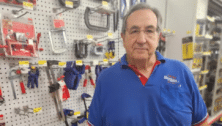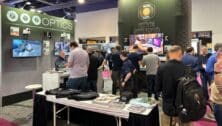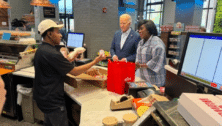Chester County Leadership – Mike George, Chief Executive Officer and President of QVC
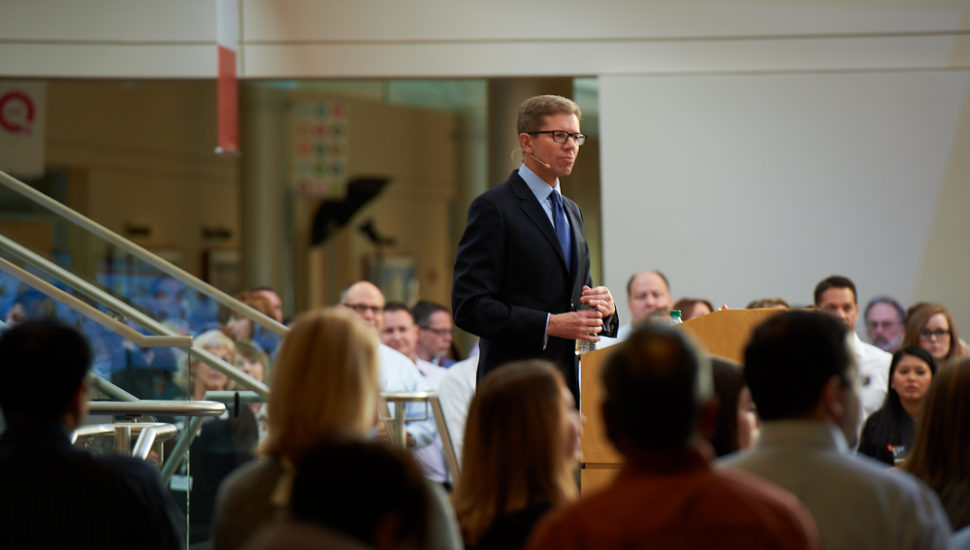
 Last week, Mike George, QVC’s CEO and President, spoke with VISTA Today about growing up in Billings, Mont., and moving with his family to Seattle when he was six, how a quest for learning led him to excel in the classroom, heading off to college and then graduate school in Chicago, before being hired by McKinsey.
Last week, Mike George, QVC’s CEO and President, spoke with VISTA Today about growing up in Billings, Mont., and moving with his family to Seattle when he was six, how a quest for learning led him to excel in the classroom, heading off to college and then graduate school in Chicago, before being hired by McKinsey.
Toward the end of the conversation, Mike speaks about why QVC remains firmly rooted in Chester County, the interactive future he envisions for Beauty iQ – a new channel devoted exclusively to cosmetics, fragrances, and skin care QVC launched in 2016 – and how advice his mother gave him (he says her advice may have been a threat!) when he was leaving for college causes him to consider the impact his decisions may have on the lives of QVC employees.
Where did you grow up, Mike?
I was born in Billings, Mont., in 1961, the third of four children. My parents came from a long line of North Dakota and Montana wheat farmers. When I was six, my dad, who was a carpenter, had to declare bankruptcy when work dried up in Billings and move the family to Seattle. I still have a picture on my desk of all six of us, our dog, and all our life’s possessions shoved into the family station wagon and a tiny U-Haul trailer.
Was moving to Seattle a difficult transition for you to make?
At the time, I didn’t appreciate what my parents were going through, so the move was a big adventure for me.
What do you remember about growing up in Seattle?
We bounced around a bit, living in different places around Seattle. Several other members of our extended family had migrated to Seattle over the years, so we did things with them. My dad found construction work in Seattle, and also spent long stretches working in Ketchikan, Alaska, which was booming at the time.
My mother, even though she had never gone to college, eventually landed a job in the Seattle Times’ research library, providing background information to reporters working at the paper – a job she held for 20 years.
Did you play any sports when you were young?
I didn’t play any sports due to my complete absence of athletic ability or coordination.
What was your first job?
I spent summers helping my father on construction jobs. Not unlike my athletic ability, I had no gift for craftsmanship. My dad and my older brother were gifted craftsmen and could build anything. Such skills always escaped me. When my father had to fire me gently, I realized I had to study and get an indoor job.
After your dad gently let you go, did you try any other jobs?
I tried several things. The job that I remember best was selling vacuum cleaners door-to-door when I was 16 years old. The vacuum cleaner could do anything from vacuuming and cleaning the carpet to washing the car. Even though I was not a typical salesman, I was shockingly successful! One day, I sold three vacuum cleaners and received a $150 commission check, more than I would have earned in a month at most other part-time jobs.
What lessons did you learn selling vacuum cleaners that stay with you today?
The way we sold vacuum cleaners included a lot of gimmicks and exaggerated claims. I didn’t feel good about my success, and ended up quitting after a couple of months. The experience taught me the importance of having integrity and truly believing in what I do. It’s why I’m so proud of our focus at QVC on building lifetime customer relationships founded on trust.
What kind of music were you listening to growing up?
I listened to the popular rock bands at the time, including AC/DC and Aerosmith, but given my Montana roots, also listed to country and southern rock, including Allman Brothers and Lynyrd Skynyrd, Waylon Jennings, and Willie Nelson. I was also big into Punk Rock and followed the Ramones and Blondie.
Were you a good student in high school?
I was always the kid that didn’t fit in my family. While my brothers were athletic and liked to build stuff, I enjoyed studying, and had a passion for learning new things.
Where did you go to college?
I was the first generation of my extended family to go to college and the first to ever go across the country. When I decided I wanted to go to college, I got a catalog and applied to all the schools that sounded interesting, some local, some farther away. Northwestern was one of the schools that caught my interest. They offered me the biggest scholarship, so without setting foot on campus, I headed off to Northwestern in Chicago.
Did Northwestern end up being a good decision for you?
It was a great decision. I had terrific experiences, made a lot of great friends, and grew up a lot. The fact that two of my four kids ended up attending Northwestern says something for how much I enjoyed my experience there.
How did you get from Northwestern to be CEO of QVC? Who gave you your big breaks?
After graduating from Northwestern, I applied and was accepted to Northwestern’s business school. It was a bit of a cop-out decision because I didn’t know what I wanted to do, and wasn’t ready to jump into the workforce. All of the sudden, I was exposed to people who had been out in the business world and returning to school to broaden their horizons. I was fascinated by strategy and organizational design. I found my niche.
What did you do after you got your MBA?
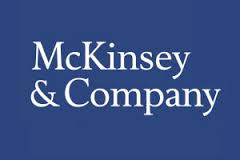 I didn’t know what I wanted to do, so I made another cop-out decision and decided to go into consulting. It was an opportunity to learn and study interesting problems. By some miracle, McKinsey, one of the great business organizations in the world, hired me out of school.
I didn’t know what I wanted to do, so I made another cop-out decision and decided to go into consulting. It was an opportunity to learn and study interesting problems. By some miracle, McKinsey, one of the great business organizations in the world, hired me out of school.
What did McKinsey see in you, Mike?
At the time, I thought they made a terrible mistake! It’s hard to say what they saw in me other than I was pretty good at thinking dispassionately about problems and engaging others in the process of solving complex challenges.
Was McKinsey’s interview process hard?
I got to the final round and had to interview with a guy named Mike Murray, who was McKinsey’s Chicago office manager. Murray, who was Irish and from Boston, had a reputation for being tough. A good guy, but brusque. Those coaching me through the hiring process warned Murray would be intimidating.
When I sat down in Mike’s office, he glared at me and asked, “Why would McKinsey even think of hiring someone [like me] with no business experience?” Murray asked me to tell him about a project I had worked on in school. I told him about Kodak’s entry into instant cameras, a case study I had recently finished.
I found out much later he was McKinsey’s lead consultant on Kodak! He tore my conclusions to shreds! Despite that experience, McKinsey hired me, and Murray became one of my mentors and a great friend.
Did you have a chance to work with Murray after you joined McKinsey?
About a year and a half later, I was randomly assigned to work on a project with the May Department Stores Company, then the largest chain of department stores in the United States. Even though I didn’t know anything about retailing, Murray, who was the lead consultant on May, tasked me with making the first presentation to Dave Farrell, May’s then CEO. Farrell had a reputation for being a very tough and intimidating boss.
Before the presentation, Mike Murray told me, that since I was Farrell’s peer, I was to address him by his first name, which no one in the company did. The presentation was in this big, intimidating boardroom. Farrell, true to form, was yelling and screaming at people sitting around the table.
When I started my presentation, I was so nervous I don’t know what I was saying. A few minutes into the presentation, Murray leans over to the other McKinsey partner on the project, and says in a whisper loud enough for everyone in the room to hear, “I told you this kid was good!”
I always remember that experience, and try to use it to help people find opportunities where they can shine. I’m not nearly as good at it as Mike Murray was.
What about Farrell? Did you and May’s CEO develop a relationship?
Over the years, I had many opportunities to work with Dave Farrell. I came to know him as both a demanding leader and a wonderful man with a big heart. He was one of those people instrumental in getting me to where I am today.
As you look into 2017, what are the challenges and opportunities for QVC?
Even though there is massive disruption happening across retail, we are excited about the future. Traditional retailers are struggling, while e-commerce companies like Amazon are growing like crazy and redefining our industry.
Having celebrated our 30th anniversary last year, we feel like we’re brand new and just getting started. We have to be clear about what we’re good at and need to preserve, while being brave enough to keep evolving at greater levels of speed and agility to fit a rapidly changing world.
We’re a retailer with highly differentiated products who tells inspiring and authentic stories, all while engaging our customer in a highly trustworthy experience.
While we’ve been doing that for 30 years, our challenge is to continually evolve that experience for new generations. In late 2016, we launched a third network called “Beauty iQ” aimed at women between 25 and 35 years of age and dedicated to all things beauty.
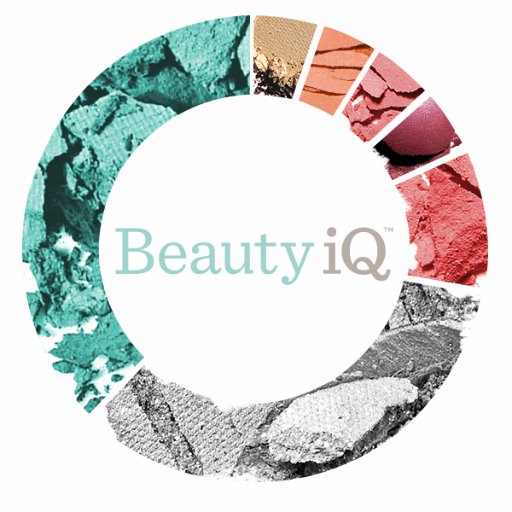 Beauty iQ is our first category-dedicated network and the only beauty network of its kind in the U.S. Our product presentations are focused on tutorials and the efficacy of the product and has a little of a “beauty blogger meets QVC” vibe to it. We’re simulcasting it on Facebook Live, hoping to reach a different generation of consumers who may not have cable TV.
Beauty iQ is our first category-dedicated network and the only beauty network of its kind in the U.S. Our product presentations are focused on tutorials and the efficacy of the product and has a little of a “beauty blogger meets QVC” vibe to it. We’re simulcasting it on Facebook Live, hoping to reach a different generation of consumers who may not have cable TV.
Unlike traditional TV, we can see and respond to viewers’ Facebook comments and shares, giving us an interactive and organic engagement with our customers.
How is Beauty iQ doing out of the gate?
It’s early and the business is still small, but we’re excited for the potential the channel offers us to introduce new beauty brands, as well as introduce a new generation of women to QVC, and also to redefine what a contemporary interactive video retailing experience can be.
You’re excited about the channel’s future.
Beauty iQ is a glimpse into QVC’s future. Over the next five years, we’ll continue to integrate cutting-edge social media and digital experiences with traditional TV experiences.
QVC could be headquartered anywhere. Why do you remain in Chester County?
We’ve never seen any reason to be anywhere other than here. I’m not a Chester County native, having moved here when I took this job. Nevertheless, I’m very proud of our roots here.
This community’s workforce vibrancy and diversity of talent are unmatched. Chester County and the Greater Philadelphia area is a community based on family, and is a wonderful place to raise kids.
QVC plays in the technology, media, and fashion industries. We talk to a lot of people who want to work for QVC, but aren’t sure Chester County is the right place for them. When we encounter that uncertainty during the interview process, if we can get them to spend an hour in our building and another hour driving around the community, they always change their mind.
Finally, Mike, what is the best piece of advice you ever received?
The best advice I ever received, although it was more like a threat, was from my mother when I left for school. She told me, “Whatever you do, whatever you become, never forget where you came from.”
Her advice may sound corny, but I’ve never forgotten it. I remember my parents’ financial difficulties and the struggles with drug and alcohol abuse that ran through our family.
I have so much respect for all of our team members who work so hard to make ends meet, take care of their families, and make a difference every day. So I try to think through every decision we make from the lens of those packing the boxes at our Rocky Mount facility or working in our contact center in Chesapeake, and how it will impact them.
Connect With Your Community
Subscribe to stay informed!
"*" indicates required fields




































![95000-1023_ACJ_BannerAd[1]](https://vista.today/wp-content/uploads/2023/03/95000-1023_ACJ_BannerAd1.jpg)








